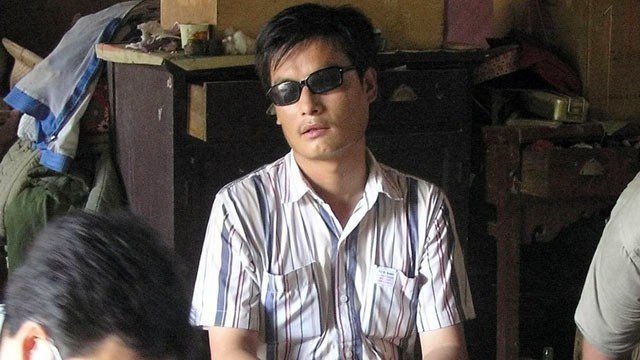
Activist Chen Guangcheng has phoned a US Congressional hearing to plead for help in his attempts to leave China with his family.
Chen Guangcheng said he feared for the safety of his family and wanted to meet visiting US Secretary of State Hillary Clinton face-to-face.
The dissident is in a Beijing hospital sealed off by Chinese police.
He had spent six days at the US embassy but left after initially accepting China’s assurances of his safety.
Chen Guangcheng said that only after leaving the embassy did he fully realize the threats that had been made against his family members.
In his call, broadcast live to the Congressional hearing from a mobile phone, Chen Guangcheng said: “I want to come to the US to rest. I have not had a rest in 10 years.
“I’m concerned most right now with the safety of my mother and brothers. I really want to know what’s going on with them.”
He said villagers who had helped him were “receiving retribution”.
Chen Guangcheng told Rep Chris Smith, who was chairing the hearing at the Congressional commission on China: “I want to meet with Secretary Clinton. I hope I can get more help from her.”
His supporter and friend, Bob Fu, acted as translator.
Chris Smith told Chen Guangcheng that the activist’s friends in the US had expressed “desperate concern” for him.
“We are praying for you and we will be unceasing in our efforts to help,” Chris Smith said.
Chen Guangcheng is in the hospital with his wife and children but the building is ringed by police and he is effectively under detention.
The dissident has expressed repeated concerns about his family members in his home village in eastern Shandong province.
Chen Guangcheng earlier said his wife had relayed to him the extent of the threats there.
“She told me our house has been installed with seven CCTV cameras inside the courtyard. There are people in and outside of our house and on the roof… They just eat and stay in our house, and they plan to build up electric wires around my house.”

Although he initially said he wanted to stay in China, Chen Guangcheng said he had changed his mind because he believed China had reneged on an agreement to guarantee his safety.
There is no official confirmation about the nature of any such agreement, but media reports from the US suggest that Chen Guangcheng had been promised safety in a university town elsewhere in China.
The case has increasing political resonance in the US.
Republican presidential candidate Mitt Romney said if reports that US officials had persuaded Chen Guangcheng to leave the embassy were true “this is a dark day for freedom and it’s a day of shame for the Obama administration”.
White House spokesman Jay Carney said President Barack Obama was “not concerned about political back-and-forth on this issue”.
Jay Carney said: “He is focused on the need to advance US interests in our broad-based relationship with China… He has and will continue to make a priority in that relationship or a part of that relationship an open and frank discussion of our concerns about human rights.”
The US has said that at no point did Chen Guangcheng ask for asylum and he was never put under any pressure to leave the embassy.
State department spokesman Mark Toner said there had only been telephone access to Chen Guangcheng on Thursday, adding: “It’s our desire to meet with him [on Friday] or in the coming days. But I can’t speak to whether we’ll have access to him. I just don’t know.”
Hillary Clinton and Treasury Secretary Timothy Geithner are in Beijing for annual bilateral talks, focusing heavily on Syria and North Korea.
As the talks opened, Hillary Clinton did not mention Chen Guangcheng by name but addressed the topic of human rights.
“The United States believes that no state can legitimately deny the universal rights that belong to every human being – or punish those who exercise them,” she said.
Chinese officials on Wednesday accused the US of interference in China’s domestic affairs and demanded an apology for housing Chen Guangcheng at the US embassy.
Chen Guangcheng had been at the embassy for almost a week after escaping from house arrest in his village in Shandong.
He had planned his escape from house arrest for months. On 27 April, Chen Guangcheng scaled the wall the authorities had built around his house and was then driven hundreds of miles to Beijing.
ABC News quoted US officials as saying an embassy vehicle drove out to meet a car carrying Chen Guangcheng, but the staff realised they were being followed. The two cars met hurriedly in an alleyway and Chen Guangcheng was bundled into the US car and driven back to the embassy, ABC said.
Several people involved in Chen Guangcheng’s escape have been detained or have disappeared in recent days.
He has spent seven years in prison or under house arrest after he exposed human rights abuses, including the way thousands of women were forced to have abortions under China’s “one-child-policy”.
[youtube pkW-0Ud86lw]